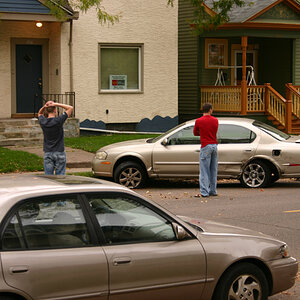kkamin
TPF Noob!
- Joined
- Aug 25, 2009
- Messages
- 515
- Reaction score
- 17
- Location
- Minneapolis
- Website
- www.kevinkaminphoto.com
- Can others edit my Photos
- Photos OK to edit
Hello,
As you know, in this day and age of digital imaging, being able to archive our image files in an uncorrupted state is of upmost importance. For all the experts out there, I am having a hard time finding a checksum program that supports dropping in whole directories rather than manually selecting files from within the directories or folders.
I tried using Checksum+ 1.5.2 but it freezes when a large directory is dragged on to the program. Checksum+ 1.5.3 just crashes at start up; I can't even get the program to work at all on Leopard 10.5.8.
Thanks for reading.
As you know, in this day and age of digital imaging, being able to archive our image files in an uncorrupted state is of upmost importance. For all the experts out there, I am having a hard time finding a checksum program that supports dropping in whole directories rather than manually selecting files from within the directories or folders.
I tried using Checksum+ 1.5.2 but it freezes when a large directory is dragged on to the program. Checksum+ 1.5.3 just crashes at start up; I can't even get the program to work at all on Leopard 10.5.8.
Thanks for reading.



![[No title]](/data/xfmg/thumbnail/37/37605-90c8efaef5b7d1f52d4bf8e7dfd33673.jpg?1619738148)



![[No title]](/data/xfmg/thumbnail/31/31746-12607d714ca2713b95250821c881aea9.jpg?1619734987)

![[No title]](/data/xfmg/thumbnail/39/39288-2d76486ccc9042c6fb525aaaaffff1fb.jpg?1619738957)


![[No title]](/data/xfmg/thumbnail/39/39291-a89dc472765e04f66f617dd9acc8030d.jpg?1619738958)
